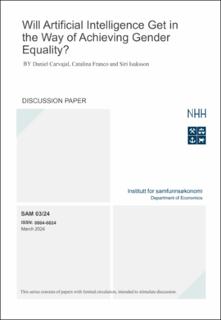| dc.description.abstract | The promise of generative AI to increase human productivity relies on developing skills to become proficient at it. There is reason to suspect that women and men use AI tools differently, which could result in productivity and payoff gaps in a labor market increasingly demanding knowledge in AI. Thus, it is important to understand if there are gender differences in AI-usage among current students. We conduct a survey at the Norwegian School of Economics collecting use and attitudes towards ChatGPT, a measure of AI proficiency, and responses to policies allowing or forbidding ChatGPT use. Three key findings emerge: first, female students report a significantly lower use of ChatGPT compared to their male counterparts. Second, male students are more skilled at writing successful prompts, even after accounting for higher ChatGPT usage. Third, imposing university bans on ChatGPT use widens the gender gap in intended use substantially. We provide insights into potential factors influencing the AI adoption gender gap and highlight the role of appropriate encouragement and policies in allowing female students to benefit from AI usage, thereby mitigating potential impacts on later labor market outcomes. | en_US |
